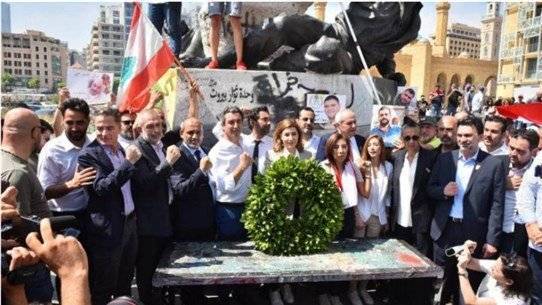After the recent session for electing the President of the Parliament, his deputy, and the secretaries and commissioners—forming the Bureau of the Council—established a precedent in the election process, especially for the Deputy Speaker which required two rounds of voting. All eyes are now on the upcoming session for electing the members of the parliamentary committees and their presidents and rapporteurs. This session might also set a precedent concerning the election mechanisms defined by the internal bylaws of the Parliament. Previously, these positions were typically filled through consensus on distributing the presidencies and rapporteurships among committee members, along with considering political blocs, sects, and denominations, all of which could be done within minutes due to prior agreements between parties before the session.
However, the innovation in tomorrow's session is the candidacy of the "Change Forces" deputies independent of prior agreements and negotiations, and their commitment to competing for committee memberships, presidencies, and rapporteurships, as previously stated in their announcement. Official nominations will reportedly be submitted today to the Parliament's General Secretariat. Sources indicate that the preliminary nominations from these deputies include Mark Daou for the presidency of the Finance and Budget Committee, Melhem Khalaf for the presidency of the Administration and Justice Committee, and Najat Aoun for the presidency of the Environment Committee. Discussions are also underway for nominations for the presidencies of the Youth and Sports Committee, the Economy Committee, or the Foreign Affairs Committee.
Despite the deputies' assurances that they aim to defend people's rights and enhance transparency within the committees based on each individual's competence, expertise, and experience, available information suggests a lack of clarity in their vision. At the very least, there seems to be no consensus to unite as a singular parliamentary bloc, which was evident in the distribution of deputies and blocs during the mandatory parliamentary consultations that the President will call for to assign the new Prime Minister. While disagreements among these deputies are not unusual—given that they are not a party or a single group—their approach appears somewhat detached from reality, which became evident in their first experience during the election of the President, his deputy, and the secretaries and commissioners. This pattern seems likely to recur during the committee elections tomorrow, as they talk about nominations for chairing committees while the norms dictate that one must first become a committee member before being elected as president and rapporteur, or coming to a consensus among themselves on those positions.
It’s worth noting that the formation and election of committees are specified in Section Six of the internal bylaws of the Parliament, occurring in the session following the election of the Bureau after general elections at the beginning of the October session each year, as stated in Article 19 of the bylaws. The election process is conducted through secret ballot according to Articles 11 and 12. The Parliament's permanent committees total 16, as revised in 2000, and include the Finance and Budget Committee (17 members), the Administration and Justice Committee (17 members), the Foreign Affairs and Expatriates Committee (17 members), the Public Works, Transport, Energy, and Water Committee (17 members), the Education, Higher Education, and Culture Committee (12 members), the Public Health, Labor, and Social Affairs Committee (12 members), the National Defense, Interior, and Municipalities Committee (17 members), the Displaced Persons Committee (12 members), the Agriculture and Tourism Committee (12 members), the Environment Committee (12 members), the National Economy, Trade, Industry, and Planning Committee (12 members), the Media and Communications Committee (12 members), the Youth and Sports Committee (12 members), the Human Rights Committee (12 members), the Women and Children Committee (12 members), and the Information Technology Committee (9 members), established on 21/10/2003.
A deputy may not be a member of more than two permanent committees unless one of them is the Human Rights Committee, the Women and Children Committee, or the Information Technology Committee. Committees meet, according to Article 23 of the internal bylaws, within three days following their election, presided over by the President of the Parliament, to elect their president and rapporteur through a secret ballot. The meeting to elect the president and rapporteur is deemed legal only if an absolute majority of its members is present.
According to monitoring sources, the fate of the session remains uncertain if things remain unreconciled and voting occurs (which could be welcome), but this will prolong the session without changing the outcomes and power balances, especially regarding the committee presidents and rapporteurs. Nevertheless, it will naturally lead to the participation of the “Change Forces” deputies in committee memberships, and they may gain the presidency of one of the committees if they coordinate well with other deputies. It is important to mention that the internal bylaws of the Parliament do not specify the nomination process for committee membership as is done for the elections for the presidency, vice presidency, and secretaries and commissioners, and this may be an issue that requires further study and amendments to the bylaws. Tomorrow will reveal more.




